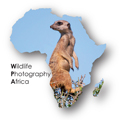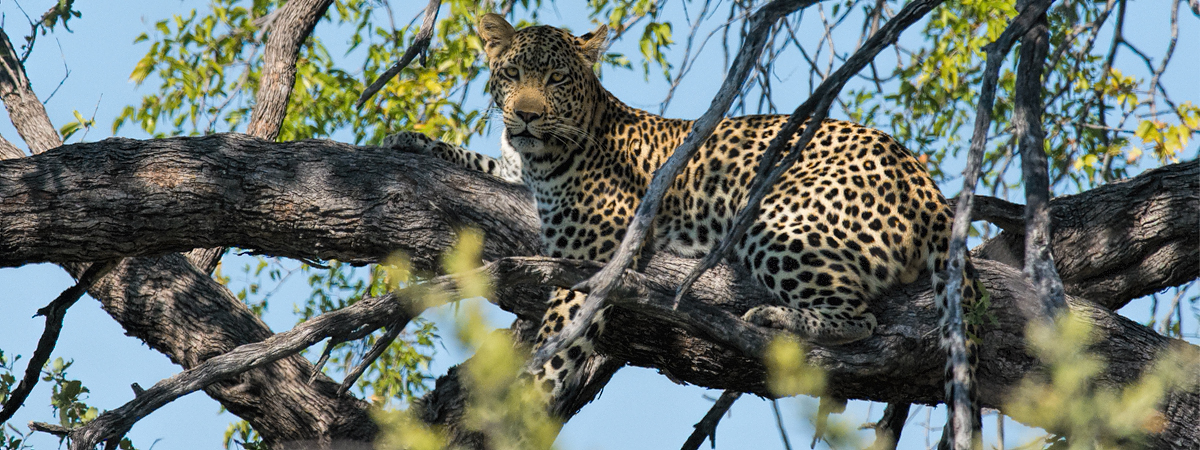What have I let myself in for?
In May 2015 I was invited to join a small group of friends on a 5 day / 4 night hiking trail in South Africa’s iMfolozi National Park. Without giving any real thought to what such a trail might involve I said ‘Yes’.
I love being out in the wilderness and sleeping under the stars so this sounded like the perfect antidote to over catered, over plush safari camps where guests are almost insulated from the bush rather than being at one with it.
Having committed myself I thought is might be a good idea to find out exactly what I had committed to and sought out information that might tell me more.
The Ezemvelo KZN Wildlife website seemed like a good place to start.
A. PRIMITIVE TRAIL
General Information
This primitive wilderness trail is aimed at the outdoors enthusiast who would like to combine a wilderness experience with backpacking and sleeping out under the stars.
The trail is designed to provide a basic living experience, with a minimum of equipment but with adequate water and food. Water is collected from springs or rivers in the wilderness area, and bathing is done in the river wherever possible. A very important part of the trail is spending time alone on watch at the fire at night. In this way one gets to embrace silence and solitude, qualities that are difficult to find in today’s world.
Trailists are required to leave their watches and cellular phones in their cars in order to experience greater freedom from time constraints and deadlines. The trail is fully catered – all equipment (including first aid kit), bedding and food is provided. (Unfortunately no special diets can be catered for). Trailists are required to assist with food preparation and camp setup. Please note that there are no ablutions and showers on this trail.
All four nights are spent out in the bush, camping wherever the Trails Officer finds a suitable spot. Camping follows a very strict ‘minimum impact, no trace’ ethic, which is in line with wilderness principles. Small camps are set up at night, with trailists sleeping under the stars around a small fire, after enjoying a meal prepared by the Trails Officer and the Field Guide.
Distances covered each day are not excessive due to the need to carry all equipment. Backpacks are sometimes left at a campsite however, and day walks taken to explore the wilderness area in relative freedom.
OK, that made it sound pretty serious. It is a good many years since I have covered any distance with a loaded backpack and reports from some of my co-trailists that they were embarking on training regimes in preparation didn’t make me feel any better.
With a few months still to go before the trail, I forgot all about it as work and other commitments pushed it to the back of my mind.
Then suddenly, it was May and time to go.
Meeting up with Matt (Matt Wilkinson founder of safaritalk.net) at Indaba did nothing to improve my confidence. Matt had been on a serious training regime and had lost 10kg in preparation for the trail. Oh well, too late to do anything about it now.
Bugs van Heerden (The Conservation Imperative) picked Matt & I up from Indaba and we set off towards iMfolozi, stopping for a night in St Lucia. An evening at the Ski Boat Club was the ideal place to relax with a pre-trail beer and to meet 2 more of our trail companions. (Not the hippos, they just happened to be mooching around in the river.)
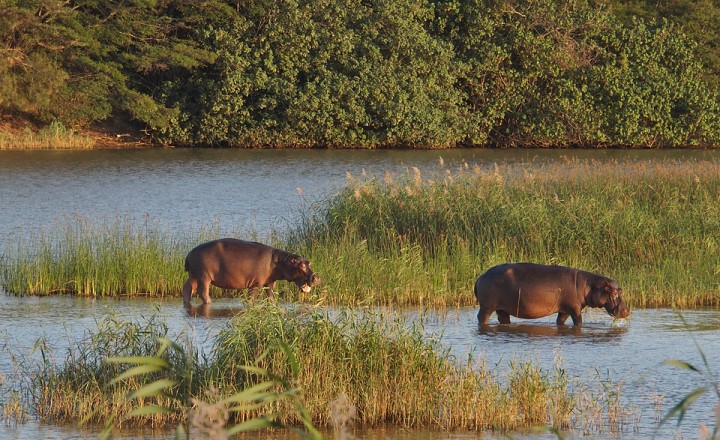
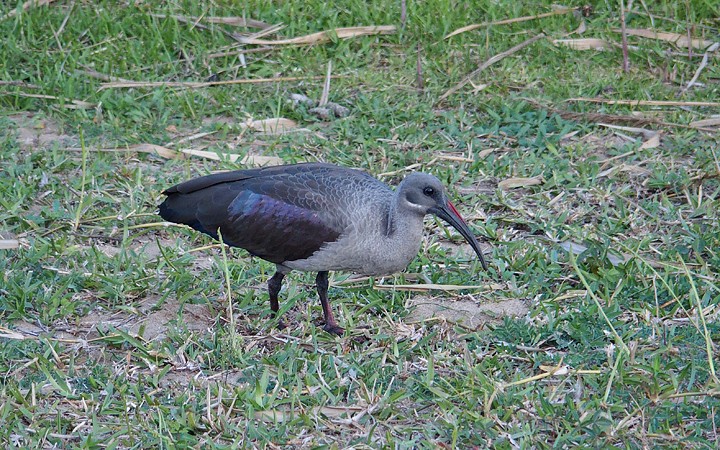
The time has come
On Day 1 of our trail we duly reported to Mpila Camp in iMfolozi NP, paid our conservation fees and met the final 3 members of our party, Sebelo our guide and Magnificent his assistant, before driving to the Base Camp where we would swap our vehicles for backpacks.
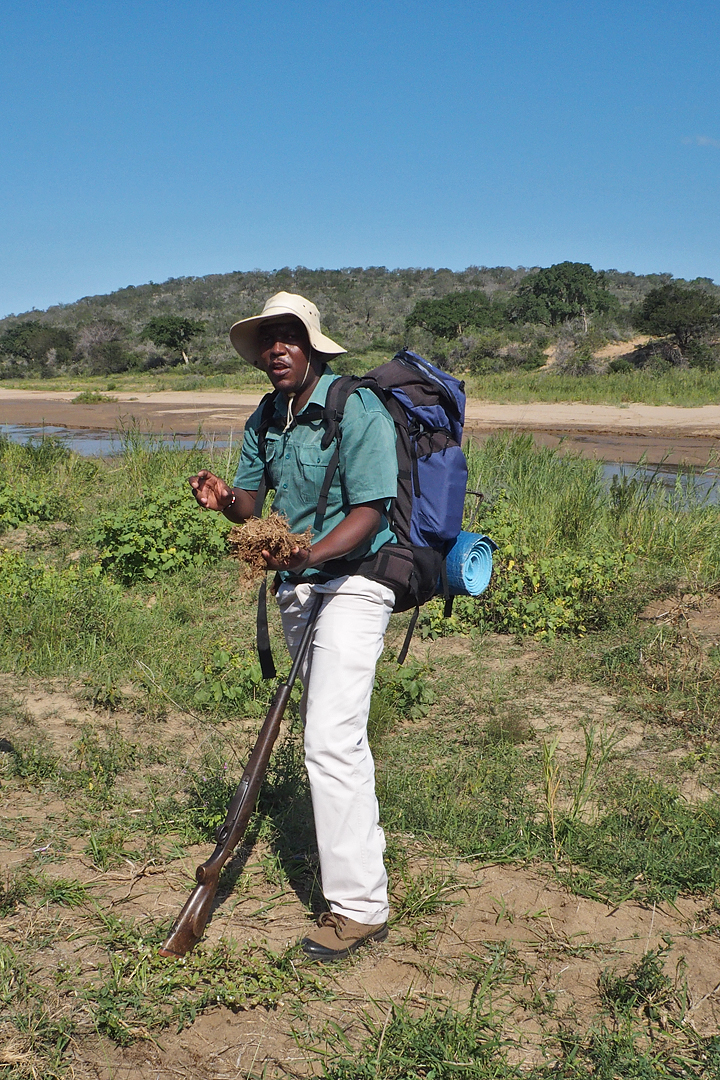
I thought I had done a pretty good job of packing; keeping the weight of my backpack to an acceptable level. Then Sebelo started laying out all the other stuff we’d need to take with us. Food for 4 days, pots, a kettle, plates, sleeping mats and groundsheets. By the time I’d squeezed everything in I reckon my pack weighed somewhere over 20kg. Not excessive, but not an insignificant weight to carry through rough terrain for 4 days.
I hadn’t been expecting haute cuisine on the Trail and a quick look at the food supplies we were packing into our rucksacks confirmed my fears. Lots of packets and tins. Most ominously, the only item of cutlery we were issued was a spoon. No solids either then.
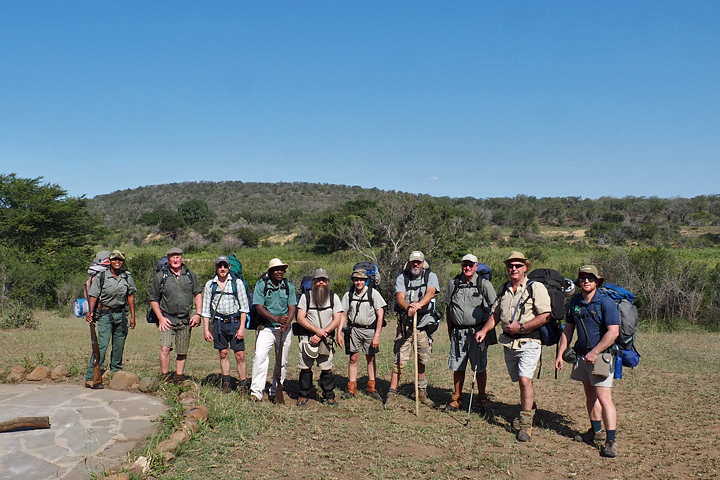
No sooner had we strapped on our backpacks than we found ourselves taking off our shoes and socks to cross the White Umfolozi river.
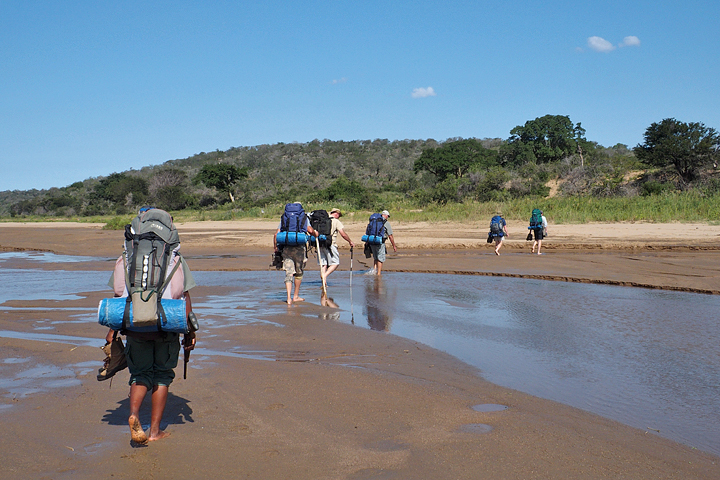
Not as exciting as it sounds as the water was only a few inches deep but over the next few days we would spend a lot of time crossing and re-crossing the White Umfolozi and we would also rely on it as our water source.
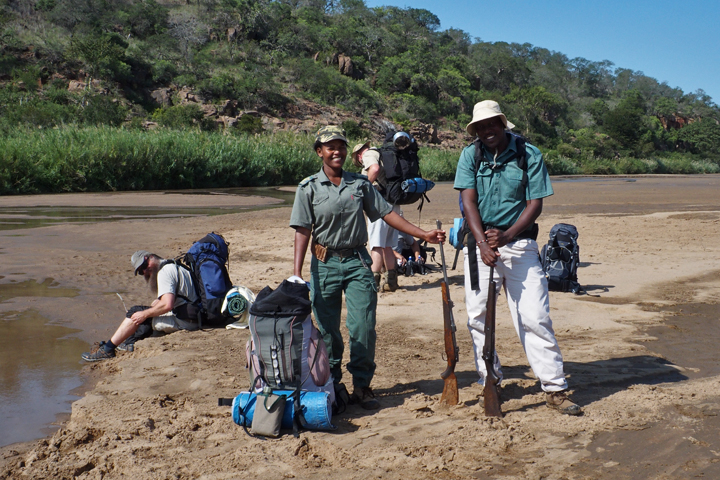
Over the next few hours Sebelo led us on a twisting trail; dense bush one minute, stony slopes the next.
It seemed that every time we had a view of the river there were old male buffaloes (Dagga Boys) resting on the cool sand.
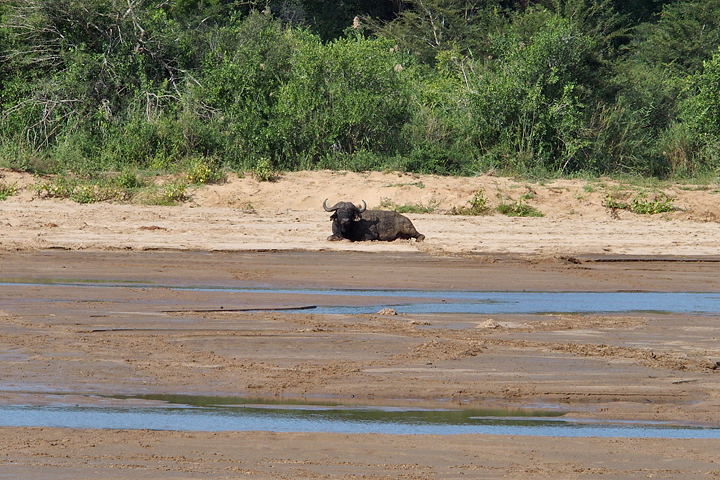
Our progress was halted by encounters with elephants and rhinos. Each time Sebelo would raise is hand to bring us to a halt and urge us to be quiet whilst he assessed the situation.
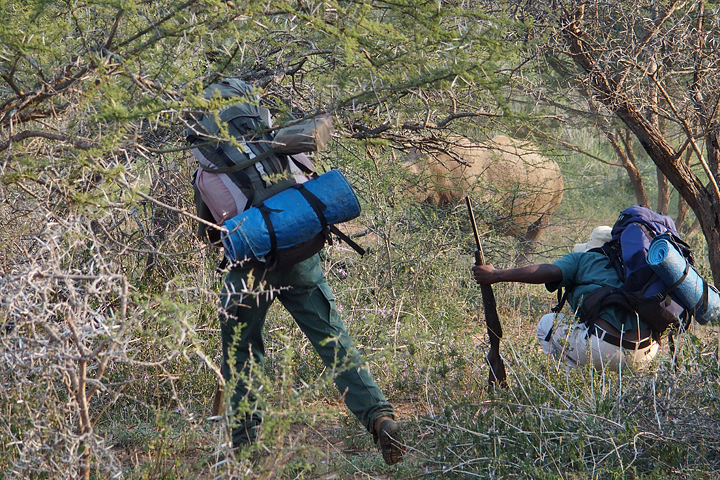

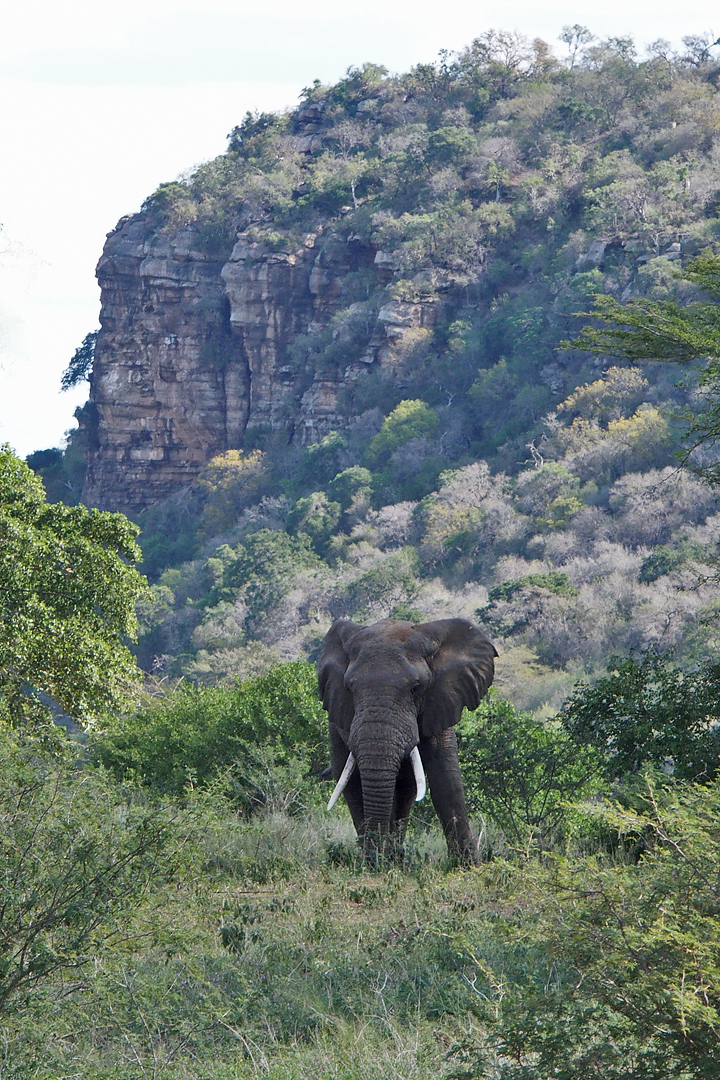
It was to be a recurring theme throughout the hike; although we did see plenty of animals on most occasions we diverted our route to give them a wide berth. This was their home and we wanted to cause a little disturbance to them as possible. Added to which, I doubt that we could have taken swift evasive action with our backpacks on.
Over the course of the afternoon I fiddled with the straps on my pack, experimenting with minor adjustments that might make my load more comfortable. Even though it wasn’t particularly hot – around 20-22 degrees C – I was sweating profusely and I know I wasn’t alone in welcoming the occasional rest stop and the chance to lay down my pack for a few minutes.
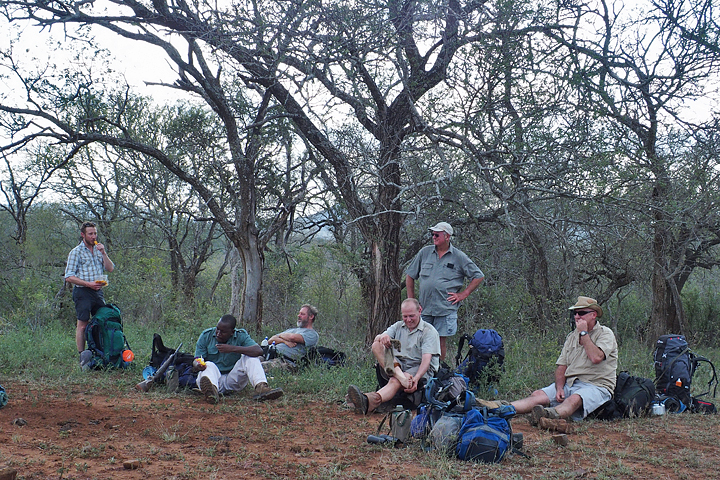
By the time we reached our camp for the night, I reckoned we’d covered about 15km but Sebelo assured me it was closer to 18.5km. No wonder I was aching. Taking off my backpack I had an incredible sensation of weightlessness. The sensation was how I imagine it must feel to be in a reduced gravity environment; I felt as if I could simply float away.
I use the word camp in its loosest sense. It was the place where we would spend the night. In fact it was a rocky outcrop overlooking the river.
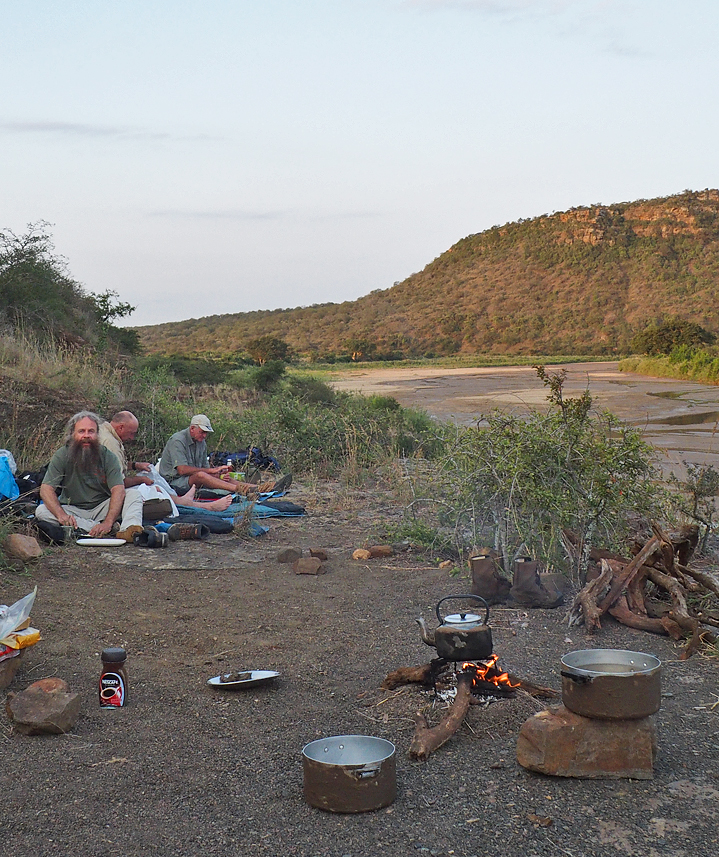
All our nights would be spent close to the river as it was our only source of water.
Even though I was tired, I could still appreciate the wonderful panoramic views.


With darkness fast approaching there wasn’t much time to dawdle. Sebelo clambered down the rocks to the river to dig some ‘wells’ (more on this later) and use the cool sand as a makeshift fridge to store our meat, while I helped get a fire started and Matt took charge of preparing dinner.
One of the interesting things I learned on the trip was how to keep pots and kettles form getting blackened by the campfire. Magnificent got a pile of mud and smeared it on the outside of the pots and the kettle before leaving it to dry n the sun. This produced a hard protective layer which could be easily washed off when it came time to break camp, leaving the kitchenware soot free. Ingenious.

One of the tasks that we would all have to participate in was the night watch. After dinner we worked out some kind of rota and then I tried to get comfortable enough on the hard – literally rock hard – ground to get a few hours sleep before being woken for my stint on watch.
